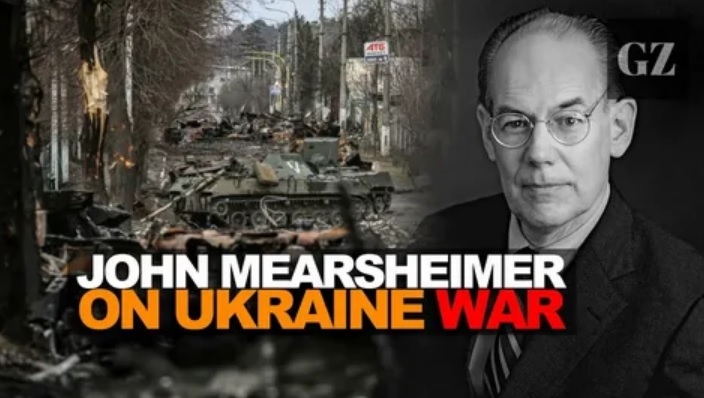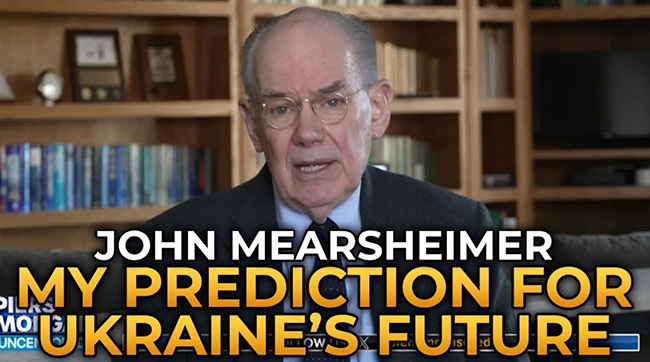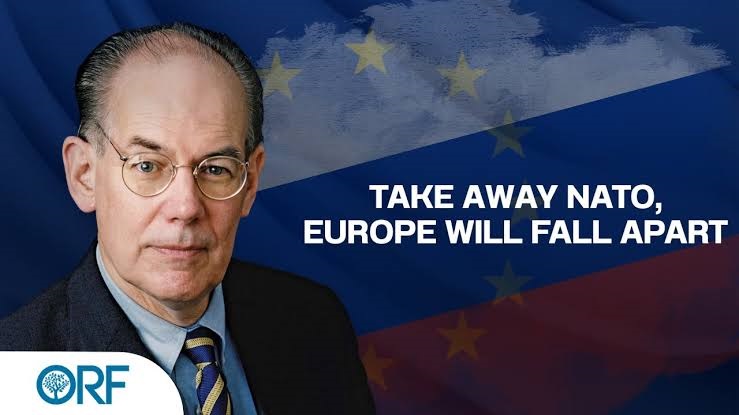
The catastrophe of the Ukraine war and a long-term shift in American interests make a stabler, more prosperous Europe unlikely, stresses John J. Mearsheimer, a professor of political science at the University of Chicago.
Europe is in deep trouble today, mainly because of the Ukraine war, which has played a key role in undermining what had been a largely peaceful region. Unfortunately, the situation is not likely to improve in the years ahead. In fact, Europe is likely to be less stable moving forward than it is today.
The present situation in Europe stands in marked contrast to the unprecedented stability that Europe enjoyed during the unipolar moment, which ran from roughly 1992, after the Soviet Union collapsed, until 2017, when China and Russia emerged as great powers, transforming unipolarity into multipolarity. We all remember Francis Fukuyama’s famous 1989 article—“The End of History?”—which argued that liberal democracy was destined to spread across the world, bringing peace and prosperity in its wake. That argument was obviously dead wrong, but many in the West believed it for more than 20 years. Few Europeans imagined in the heyday of unipolarity that Europe would be in so much trouble today.
So, what went wrong?
The Ukraine war, which I will argue was provoked by the West, and especially the U.S., is the principal cause of Europe’s insecurity today. Nevertheless, there is a second factor at play: the shift in the global balance of power in 2017 from unipolarity to multipolarity, which was sure to threaten the security architecture in Europe. Still, there is good reason to think this shift in the distribution of power was a manageable problem. But the Ukraine war, coupled with the coming of multipolarity, guaranteed big trouble, which is not likely to go away in the foreseeable future.
The Shift From Unipolarity to Multipolarity
The key to preserving stability in Western Europe during the Cold War and all of Europe during the unipolar moment was the U.S. military presence in Europe, which was embedded in NATO. The U.S., of course, has dominated that alliance from the beginning, which has made it almost impossible for the member states underneath the American security umbrella to fight with each other. In effect, the U.S. has been a powerful pacifying force in Europe. Today’s European elites recognize that simple fact, which explains why they are deeply committed to keeping American troops in Europe and maintaining a U.S.-dominated NATO.
During unipolarity, which again ran from 1992 to 2017, the U.S. was by far the most powerful state in the international system, and it could easily maintain a substantial military presence in Europe. Its foreign policy elites, in fact, not only wanted to maintain NATO but grow it by expanding the alliance into Eastern Europe.
This unipolar world went away, however, with the coming of multipolarity. The US was no longer the only great power in the world. China and Russia were now great powers, which meant that American policymakers had to think differently about the world around them.
Russia is contrary to what many Europeans think, it is not a threat to overrun all of Ukraine, much less eastern Europe. After all, it has spent the past three and a half years just trying to conquer the eastern one-fifth of Ukraine.
Given this distribution of global power, there is a strategic imperative for the U.S. to focus on containing China and preventing it from dominating East Asia. There is no compelling strategic reason, however, for the U.S. to maintain a significant military presence in Europe, given that Russia is not a threat to become a European hegemon.
To fully understand the consequences of the Ukraine war, it is essential to consider its causes, because the reason Russia invaded Ukraine in February 2022 says a great deal about Russia’s war aims and the long-term effects of the war.
The Real Cause of the Ukraine War
In fact, the United States and its European allies provoked the war. This is not to deny, of course, that Russia started the war by invading Ukraine. But the underlying cause of the conflict was the NATO decision to bring Ukraine into the alliance, which virtually all Russian leaders saw as an existential threat that must be eliminated. But NATO expansion is not the whole problem, as it is part of a broader strategy that aims to make Ukraine a Western bulwark on Russia’s border. Bringing Kiev into the European Union (EU) and promoting a color revolution in Ukraine—in other words, turning it into pro-Western liberal democracy—are the other two prongs of the policy. Russian leaders fear all three prongs, but they fear NATO expansion the most. As Putin put it, “Russia cannot feel safe, develop, and exist while facing a permanent threat from the territory of today’s Ukraine.” In essence, he was not interested in making Ukraine a part of Russia; he was interested in making sure it did not become what he labelled a “springboard” for Western aggression against Russia. To deal with this threat, Putin launched a preventive war on February 24, 2022.
The logic of Putin’s position should make perfect sense to Americans, who have long been committed to the Monroe Doctrine, which stipulates that no distant great power is allowed to form an alliance with a country in the Western Hemisphere and locate its military forces there. The United States would interpret such a move as an existential threat and go to great lengths to eliminate the danger. Of course, this is what happened during the Cuban Missile Crisis in 1962, when President John Kennedy made it clear to the Soviet leaders that their nuclear-tipped missiles would have to be removed from Cuba. Putin is deeply influenced by the same logic. After all, great powers do not want distant great powers moving military forces into areas near their own territory.

The Prospects for a Peaceful Settlement
Settling the war diplomatically is not possible because the opposing sides have irreconcilable demands. Moscow insists that Ukraine must be a neutral country, which means it cannot be in NATO or have meaningful security guarantees from the West. The Russians also demand that Ukraine and the West recognize their annexation of Crimea and the four oblasts in eastern Ukraine. Their third key demand is that Kiev limit the size of its military to the point where it presents no military threat to Russia. Unsurprisingly, Europe and especially Ukraine categorically reject these demands. Ukraine refuses to concede any territory to Russia, while European and Ukrainian leaders continue to push to bring Ukraine into NATO or at least allow the West to provide Kiev with a serious security guarantee. Disarming Ukraine to a point that satisfies Moscow is also a non-starter. There is no way these opposing positions can be reconciled to produce a peace agreement.
Thus, the war will be settled on the battlefield. Although I believe Russia will win, it will not win a decisive victory where it ends up conquering all of Ukraine. Instead, it is likely to gain an ugly victory, where it ends up occupying somewhere between 20 to 40 percent of pre-2014 Ukraine, while Ukraine ends up as a dysfunctional rump state covering the territory that Russia does not conquer.
Consequences
Ukraine has effectively been wrecked. It has already lost a substantial portion of its territory and is likely to lose more land before the fighting stops. Its economy is in tatters with no prospect of recovery in the foreseeable future, and according to my calculations, it has suffered roughly 1 million casualties, a staggering number for any country, but certainly for one that is said to be in a “demographic death spiral.” Russia has paid a significant price as well, but it has suffered nowhere near as much as Ukraine.
Europe will almost certainly remain allied with rump Ukraine for the foreseeable future, given sunk costs and the profound Russophobia that pervades the West. But that continuing relationship will not work to Kiev’s advantage for two reasons. First, it will incentivize Moscow to interfere in Ukraine’s domestic affairs to cause it economic and political trouble, so that it is not a threat to Russia and is in no position to join either NATO or the EU. Second, Europe’s commitment to supporting Kiev no matter what motivates the Russians to conquer as much Ukrainian territory as possible while the war is raging, so as to maximize the weakness of the Ukrainian rump state that remains once the conflict is frozen.
What about relations between Europe and Russia moving forward? They are likely to be poisonous for as far as the eye can see. Both the Europeans and surely the Ukrainians will work to undermine Moscow’s efforts to integrate the Ukrainian territories it has annexed into greater Russia as well as look for opportunities to cause the Russians economic and political trouble. Russia, for its part, will look for opportunities to cause economic and political trouble inside of Europe and between Europe and the U.S.
Russian leaders will have a powerful incentive to fracture the West as much as possible, since the West will almost certainly have its gunsights on Russia.

The threat of a major European war will not go away when the fighting stops in Ukraine
A Russian victory in Ukraine would be a stunning defeat for Europe. Or to put it in slightly different words, it would be a stunning defeat for NATO, which has been deeply involved in the Ukraine conflict since it started in February 2014. Indeed, the alliance has been committed to defeating Russia since the conflict turned into a major war in February 2022.
NATO’s defeat will lead to recriminations between member states and inside many of them as well. Who is to blame for this catastrophe will matter greatly to the governing elites in Europe and surely there will be a powerful tendency to blame others and not accept responsibility themselves. The debate over “who lost Ukraine” will take place in a Europe that is already wracked by fractious politics both between countries and inside them. In addition to these political fights, some will question the future of NATO, given that it failed to check Russia, the country that most European leaders describe as a mortal threat. It seems almost certain that NATO will be much weaker after the Ukraine war is shut down than it was before that war started.
Then there is the all-important question of whether the U.S. will significantly reduce its military footprint in Europe or maybe even pull all its combat troops out of Europe. As I emphasized at the start of my talk, independent of the Ukraine war, the historic shift from unipolarity to multipolarity has created a powerful incentive for the U.S. to pivot to East Asia, which effectively means pivoting away from Europe. That move alone has the potential to put an end to NATO, which is another way of saying an end to the American pacifier in Europe.
What has happened in Ukraine since 2022 makes that outcome more likely.
Most European leaders will blame Putin for causing the war, and thus for its terrible consequences. But they are wrong. The war could have been avoided if the West had not decided to bring Ukraine into NATO or even if it had backed off from that commitment once the Russians made their opposition clear. Had that happened, Ukraine would almost certainly be intact today within its pre-2014 borders, and Europe would be more stable and more prosperous. But that ship has sailed, and Europe must now deal with the disastrous results of a series of avoidable blunders.
read more in our Telegram-channel https://t.me/The_International_Affairs

 10:20 22.11.2025 •
10:20 22.11.2025 •






















